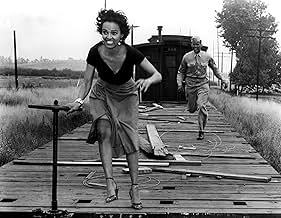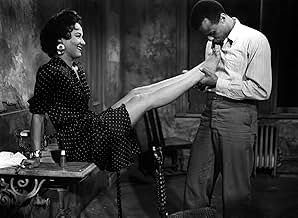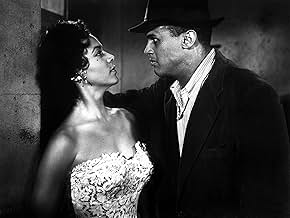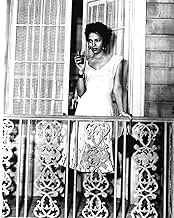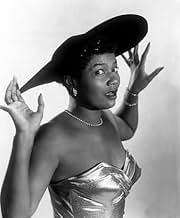CALIFICACIÓN DE IMDb
6.7/10
6.1 k
TU CALIFICACIÓN
Una versión contemporánea de la ópera de Bizet, con nuevas letras y un reparto afroamericano.Una versión contemporánea de la ópera de Bizet, con nuevas letras y un reparto afroamericano.Una versión contemporánea de la ópera de Bizet, con nuevas letras y un reparto afroamericano.
- Nominado a 2 premios Óscar
- 5 premios ganados y 8 nominaciones en total
Brock Peters
- Sergeant Brown
- (as Broc Peters)
LeVern Hutcherson
- Joe
- (voz)
- (as Le Vern Hutcherson)
Marilyn Horne
- Carmen Jones
- (voz)
- (as Marilynn Horne)
Alvin Ailey
- Dance Soloist
- (sin créditos)
DeForest Covan
- Trainer
- (sin créditos)
Joseph E. Crawford
- Dink Franklin
- (doblaje en canto)
- (sin créditos)
Carmen De Lavallade
- Dance Soloist
- (sin créditos)
Bernie Hamilton
- Reporter
- (sin créditos)
Margaret Lancaster
- Singing Voice
- (sin créditos)
- Dirección
- Guionistas
- Todo el elenco y el equipo
- Producción, taquilla y más en IMDbPro
Argumento
¿Sabías que…?
- TriviaEartha Kitt was offered the role of Carmen, but the studio wanted her singing voice to be dubbed, so that her character would have an operatic voice. The same offer was made to Harry Belafonte and Diahann Carroll who accepted, but Kitt refused, wanting to use her natural voice. Dubbing was not required for Pearl Bailey, whose own voice suited her comedic songs.
- ErroresThe story takes place circa 1944, but all of the women's fashions and hairstyles are strictly 1954; when Carmen and Frankie are talking outside the Chicago Pawn Shop, 1950s-era automobiles passing by can clearly be seen reflected in the showcase window.
- Citas
Carmen Jones: I always did want to see the big town.
Frankie: You got your wish, honey. Somethin' tells me Chicago's gonna be real good for you.
Myrt: Somethin' tells me you gonna be real *bad* for Chicago.
- Créditos curiososThe opening credits and end title are set around a flaming rose.
- ConexionesFeatured in Small Steps, Big Strides: The Black Experience in Hollywood (1998)
Opinión destacada
Carmen (1954)
First of all, this is a gorgeous movie. The WWII-era sets, the fluid photography with a lot of long takes, the lighting and costumes and overall feel are elegant and un-compromised, first frame to last.
Second, the idea is fabulous, an all-Black cast and an African-American adaptation of the classic Carmen opera (by the French composure Bizet). The vernacular and the stereotypes might seem worn, or even insulting if you take them wrong (or just take them out of context) but in fact it's in line with that even better, earlier opera, Gershwin's Porgy and Bess. The stereotypes are ones that made sanitized sense equally to White and Black America just as other musicals made sanitized sense to the same audiences. If I sound like an apologist, I'm only responding to attacks on the film ("farcical" "gruesome" or "dreadful"), as being untrue or insensitive to Blacks, by saying that nearly all musicals are incredibly stylized and false, and nearly all movies of this era played with safe, simplified versions of life.
No, to be fair to this really interesting movie you need to treat it like you would your own favorite movies from the 1950s, accepting the limitations just as the movie makers did. It's got its own syntax and style, it's own inner set of rules.
And within those the performance of the character Carmen by Dorothy Dandridge is incredible. She's on fire, introspective, nuanced, and outrageous. The cast around her is excellent but inevitably uneven, and she stands easily above them in pure performance energy, even over the other big star, Harry Belafonte.
All of this said, the beautiful, finely made, early widescreen movie here, "Carmen Jones," is lacking some kind of necessary intensity to work. I can't pin down why. From little strains of Bizet that perk it up (like a boxing worker whistling the most famous theme as he works) to the truly perfect photography and editing (maybe too perfect?), the movie has a steady, compelling flow. It's based on a Broadway musical from 1943 (the year the movie is set, as well), and it has the bones of a great drama, if a familiar one (it's still Bizet).
What might be the biggest problem is the understandable decision to film it in a realistic way, with song (and minimal dance) numbers inserted relatively seamlessly along the way. This is the standard musical approach from from the early Astaire-Rogers films to the relatively contemporaneous Arthur Freed productions of the early 1950s like "Singin' in the Rain." But Carmen, the opera and stage musical, is not a lighthearted romantic comedy. It isn't just escapist entertainment. And the gravitas and drama in it, at the end in particular, doesn't quite work the way it does on the opera stage. You watch Belafonte and Dandridge acting their hearts out, but it has that perfect 1950s movie-making production to remind us that it's a movie, and we are detached in a far different way than watching a stage version, with real people and false settings.
But never mind all that--you'll see for yourself how absorbed you get and why not more so.
A couple last things. First, the singing voices of the two leads are dubbed (yes!), surprising in Belafonte's case in particular because he was (and is) an accomplished singer. Second, Dandridge and director Preminger were having a longterm affair during the filming and after, and she pulls off what might be the best performance of her life here. Third, the movie was shown to the head of the NAACP before release to check on any problems that might be seen from an African-American point of view (this is 1954, remember) and no objections were raised. By this point, Preminger had been working with an all Black cast and was in close quarters with the leading lady so he must have had some sense that what he was after was on target for the time.
Watch it if you have interest in any of these things--WWII civilian life, Dandridge or Belafonte, opera adaptations into movies, early big budget African-American movies, Preminger movies, or terrific early Cinemascope photography. That should cover a lot of viewers, but not all. For me, I liked it a lot, and liked parts of it enormously (like the short clip of Max Roach drumming away on a barroom stage). But I felt slightly restless too often to get totally absorbed. One last suggestion--see it on the biggest screen you can, so it will be immersive.
First of all, this is a gorgeous movie. The WWII-era sets, the fluid photography with a lot of long takes, the lighting and costumes and overall feel are elegant and un-compromised, first frame to last.
Second, the idea is fabulous, an all-Black cast and an African-American adaptation of the classic Carmen opera (by the French composure Bizet). The vernacular and the stereotypes might seem worn, or even insulting if you take them wrong (or just take them out of context) but in fact it's in line with that even better, earlier opera, Gershwin's Porgy and Bess. The stereotypes are ones that made sanitized sense equally to White and Black America just as other musicals made sanitized sense to the same audiences. If I sound like an apologist, I'm only responding to attacks on the film ("farcical" "gruesome" or "dreadful"), as being untrue or insensitive to Blacks, by saying that nearly all musicals are incredibly stylized and false, and nearly all movies of this era played with safe, simplified versions of life.
No, to be fair to this really interesting movie you need to treat it like you would your own favorite movies from the 1950s, accepting the limitations just as the movie makers did. It's got its own syntax and style, it's own inner set of rules.
And within those the performance of the character Carmen by Dorothy Dandridge is incredible. She's on fire, introspective, nuanced, and outrageous. The cast around her is excellent but inevitably uneven, and she stands easily above them in pure performance energy, even over the other big star, Harry Belafonte.
All of this said, the beautiful, finely made, early widescreen movie here, "Carmen Jones," is lacking some kind of necessary intensity to work. I can't pin down why. From little strains of Bizet that perk it up (like a boxing worker whistling the most famous theme as he works) to the truly perfect photography and editing (maybe too perfect?), the movie has a steady, compelling flow. It's based on a Broadway musical from 1943 (the year the movie is set, as well), and it has the bones of a great drama, if a familiar one (it's still Bizet).
What might be the biggest problem is the understandable decision to film it in a realistic way, with song (and minimal dance) numbers inserted relatively seamlessly along the way. This is the standard musical approach from from the early Astaire-Rogers films to the relatively contemporaneous Arthur Freed productions of the early 1950s like "Singin' in the Rain." But Carmen, the opera and stage musical, is not a lighthearted romantic comedy. It isn't just escapist entertainment. And the gravitas and drama in it, at the end in particular, doesn't quite work the way it does on the opera stage. You watch Belafonte and Dandridge acting their hearts out, but it has that perfect 1950s movie-making production to remind us that it's a movie, and we are detached in a far different way than watching a stage version, with real people and false settings.
But never mind all that--you'll see for yourself how absorbed you get and why not more so.
A couple last things. First, the singing voices of the two leads are dubbed (yes!), surprising in Belafonte's case in particular because he was (and is) an accomplished singer. Second, Dandridge and director Preminger were having a longterm affair during the filming and after, and she pulls off what might be the best performance of her life here. Third, the movie was shown to the head of the NAACP before release to check on any problems that might be seen from an African-American point of view (this is 1954, remember) and no objections were raised. By this point, Preminger had been working with an all Black cast and was in close quarters with the leading lady so he must have had some sense that what he was after was on target for the time.
Watch it if you have interest in any of these things--WWII civilian life, Dandridge or Belafonte, opera adaptations into movies, early big budget African-American movies, Preminger movies, or terrific early Cinemascope photography. That should cover a lot of viewers, but not all. For me, I liked it a lot, and liked parts of it enormously (like the short clip of Max Roach drumming away on a barroom stage). But I felt slightly restless too often to get totally absorbed. One last suggestion--see it on the biggest screen you can, so it will be immersive.
- secondtake
- 17 sep 2012
- Enlace permanente
Selecciones populares
Inicia sesión para calificar y agrega a la lista de videos para obtener recomendaciones personalizadas
- How long is Carmen Jones?Con tecnología de Alexa
Detalles
- Fecha de lanzamiento
- País de origen
- Idioma
- También se conoce como
- Oscar Hammerstein's Carmen Jones
- Locaciones de filmación
- Southern Pacific railroad crossing at 8746 E Los Angeles Avenue, aka California Highway 118, Moorpark, California, Estados Unidos(scene where Carmen attempts escape from the Jeep)
- Productora
- Ver más créditos de la compañía en IMDbPro
Taquilla
- Presupuesto
- USD 750,000 (estimado)
- Tiempo de ejecución1 hora 45 minutos
- Color
- Relación de aspecto
- 2.55 : 1
Contribuir a esta página
Sugiere una edición o agrega el contenido que falta

Principales brechas de datos
By what name was Carmen Jones (1954) officially released in India in English?
Responda


